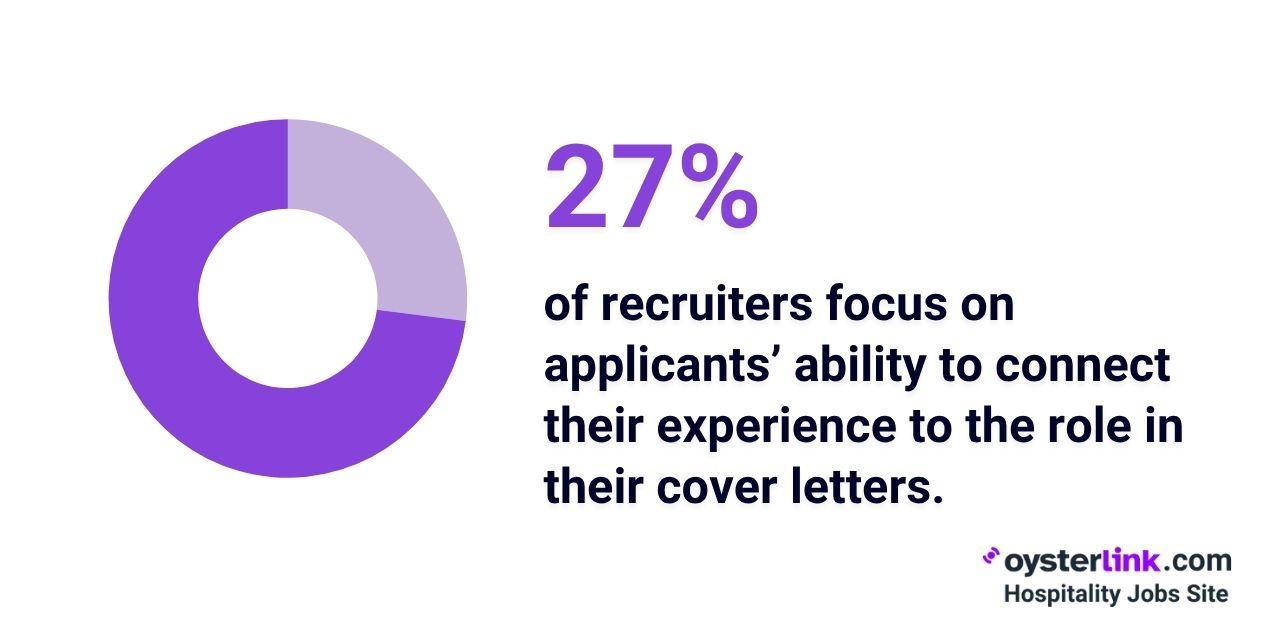Chef Cover Letter Examples and Templates: Key Findings
- 83% of recruiters say a personalized cover letter helps show you're a strong fit for the company.
- Chef and Head Cook roles are expected to grow 8% by 2033, with 24,600 openings each year.
- Casual kitchens prefer friendly letters, while upscale restaurants expect a more formal tone.
In this article, we’ll explore the essential components of writing an engaging Chef cover letter, including detailed examples and templates tailored for different types of establishments. By the end, you'll have a strong grasp on how to effectively present your skills, experience and enthusiasm for a Chef role.
Chef Cover Letter Examples
Cover letters are usually categorized into two groups – formal and casual. If you want to become a Chef, the choice between these two options depends on the type of restaurant you're applying to.
And with employment for Chefs and Head Cooks projected to grow 8% between 2023 and 2033, creating around 24,600 job openings per year, making a strong first impression with a tailored Chef cover letter is more important than ever. Let's explore both styles and help you write one that stands out.
Casual cover letter
If you're applying for a Chef job in a casual or family-owned restaurant, you can opt for a more casual and therefore friendly cover letter. This approach will help you land a role in establishments that value personality and enthusiasm more than formality and a high level of professionalism.
Of course, this doesn't mean your application letter should be unprofessional. You should still use polite language and a respectful tone. You can look at how we tackled this in the Chef cover letter example below.
[Your Name, Address, City, State, Phone Number, Email Address, Date]
[Hiring Manager Name, Restaurant Name, Address]
Dear [Hiring Manager Name]
I'm writing to express my interest in the Chef position at [Restaurant Name]. I have worked in the culinary industry for over [six years], with one year of experience as a [Pastry Chef].
As someone with a passion for cooking, I'm excited about the opportunity to join and manage a new kitchen team.
I'm passionate about creating new dishes and delivering exceptional dining experiences to patrons. I thrive in collaborative environments and believe a kitchen team is like a family.
At my last job at [Restaurant Name] in the [Pastry Chef] role, I was tasked with dessert preparation, plating and menu planning. I collaborated closely with the rest of the kitchen staff to ensure our desserts complement the overall dining experience for patrons and meet the standards of the restaurant.
Thank you for considering my application. I'm excited about the opportunity to work at [Restaurant Name].
Sincerely,
[Your Name]
Formal cover letter
While a friendly cover letter may be suitable for casual restaurants, most Chef positions you'll find when hunting for a job will be in larger and upscale restaurants that value professionalism. This is especially the case if you're interested in higher-ranking Chef roles such as the one of a Head Chef or the one of an Executive Chef.
In a more formal Chef cover letter, it's important to showcase your professionalism and highlight your qualifications. This will give the Hiring Manager more reason to look at your resume and consider you for the role. To do so, you can use the formal Chef cover letter template below.
[Your Name, Address, City, State, Phone Number, Email Address]
[Hiring Manager Name, Restaurant Name, Address]
Dear Mr./Mrs. [Hiring Manager Name],
I am writing to express my interest in the Chef position at [Restaurant Name]. With over [14 years] of experience in the culinary industry, I believe my extensive background and passion for cooking make me a strong candidate for this role.
During my employment at [Previous Restaurant Name], I spent over [five years] in the [Sous Chef] position. I was tasked with assisting the Head Chef in ensuring high standards of food quality, menu development and managing kitchen staff. In their absence, I also led the kitchen team myself.
While working as a [Sous Chef], I developed exceptional culinary skills, organizational skills, an eye for detail and a strong ability to lead a team in the kitchen environment.
Throughout my career, I have obtained several Chef certifications, all of which are listed in my resume. While completing those programs, I received formal training in food safety regulations and key sanitation practices.
I am excited about the opportunity to work at [Restaurant Name] and admire its reputation for innovation and quality. I am eager to bring the skills I have developed over the years to your admired restaurant.
Thank you for considering my application. I look forward to the opportunity to discuss how my expertise aligns with your needs. I am available for an interview at your earliest convenience.
Sincerely,
[Your Name]
Personalizing Your Chef Cover Letter for Different Roles
Personalizing your letter not only shows that you’ve done your research but also demonstrates your genuine interest in the position.
83% of recruiters agree that a well-written cover letter gives you a valuable opportunity to show you’re a great fit for the company —even if it’s not always required.
Here’s how to customize your cover letter for various Chef roles:
- Sous Chef: Emphasize your leadership, kitchen management, and ability to handle pressure. Highlight experience overseeing operations, ensuring food safety, and supporting the Head Chef’s vision.
- Pastry Chef: Focus on your pastry techniques, dessert creativity, and presentation skills. Mention any formal pastry training and your understanding of flavor, texture, and innovation.
- Executive Chef: Showcase your leadership, budgeting, and menu development skills. Highlight experience managing full kitchen operations, supplier relations, and maintaining food quality standards.
By adjusting your cover letter to focus on the skills and experience most relevant to each specific role, you can better demonstrate that you're not only qualified but also highly interested in the particular position you're applying for.
Chef Cover Letter Writing Tips
Crafting a compelling Chef cover letter involves more than listing your experience; it's about showcasing your passion, skills and fit for the role.
27% of recruiters say they primarily look for how well an applicant connects their past experience to the specific demands of the role — so making that link clear is key.

Consider the following tips:
- Highlight relevant skills: Emphasize both hard and soft skills pertinent to the Chef role, such as culinary techniques, kitchen management, creativity and teamwork.
- Highlighting certifications and training: In the competitive culinary industry, possessing relevant certifications can set you apart from other candidates. Consider mentioning any specialized training in international cuisines or dietary accommodations. For instance, "Having completed the ServSafe Food Handler certification, I ensure the highest standards of food safety and sanitation in my kitchen practices."
- Quantify achievements: Use specific numbers to demonstrate your impact, like increasing customer satisfaction by a certain percentage or reducing food costs.
- Tailor to the job description: Customize your cover letter to reflect the specific requirements and values of the restaurant you're applying to.
- Proofread carefully: Ensure your cover letter is free from spelling and grammar errors to reflect professionalism.
How To Write a Chef Cover Letter in 3 Steps
While your resume provides an overview of your skills and experience, your Chef cover letter gives you the opportunity to delve deeper into your qualifications and express your enthusiasm for the role.
If you're unsure where to start, this quick video breaks down the process clearly:
Here’s how to write an impactful cover letter Chef application in three steps:
Step 1 – Write an Engaging Introduction
Start with a strong elevator pitch, just like in the Chef cover letter samples above. Briefly summarize who you are, your culinary background and your passion for the role. This sets the tone and makes a strong first impression.
Step 2 – Show Why You're a Good Fit
Hiring Managers are extra selective when it comes to Chef roles, especially Head or Executive Chef positions. Use your cover letter to highlight your culinary skills, leadership experience and any Chef certifications you hold.
Mention key responsibilities you've handled, innovative dishes you’ve created or teams you've led. Always align your strengths with the job description.
Step 3 – End with a Confident Closing
Thank the Hiring Manager for their time and express your interest in the role. Use phrases like “I’m excited to” or “I look forward to.” Then, proofread your letter and make sure it’s polished before sending.
Chef Cover Letter Mistakes To Avoid
A strong cover letter can help you stand out from the competition, but common mistakes can undermine your efforts. Here are several key errors to avoid when writing your chef cover letter:
- Being too generic: Avoid using a one-size-fits-all cover letter. Instead, tailor your letter to each specific application by mentioning the restaurant's name and aligning your skills with their requirements. For example, "I am impressed by [Restaurant Name]'s commitment to farm-to-table dining and believe my experience with local sourcing would be an asset to your team."
- Focusing too much on your resume: While it's important to highlight your experience, your cover letter should not simply restate your resume. Use this opportunity to convey your passion for the culinary arts and provide context to your achievements. For instance, "Leading a kitchen renovation project not only improved workflow but also reinforced my belief in the importance of an organized cooking environment."
- Neglecting the restaurant’s culture and style: Demonstrating an understanding of the establishment's ethos shows that you've done your homework and are genuinely interested in being part of their team. You might note, "Your restaurant's focus on sustainable seafood resonates with my dedication to environmentally conscious cooking."
- Lack of specific skills or certifications: Ensure you mention relevant skills and certifications that match the job description. For example, "My proficiency in molecular gastronomy techniques and certification in advanced food safety align well with the innovative approach your restaurant is known for."
- Too long or too short: Aim for a cover letter length of about 250-400 words. This provides enough space to convey your qualifications without overwhelming the reader. Be concise yet informative, ensuring every sentence adds value to your application.
What Employers Look for in a Chef Cover Letter
When reviewing Chef cover letters, employers look for more than just culinary skills—they want to see passion, leadership, and a strong fit with their restaurant’s culture.
- Passion for cooking: Show your genuine love for food and why you chose this career path. Enthusiasm matters.
- Culinary creativity: Highlight your ability to innovate, from signature dishes to experimenting with flavors and cuisines.
- Kitchen leadership: For senior roles, emphasize your experience managing staff, maintaining quality, and running a smooth kitchen.
- Cultural fit: Align your values with the restaurant’s mission—whether it’s sustainability, local sourcing, or a unique dining concept.
- Attention to detail: A polished, error-free letter reflects the same precision expected in the kitchen.
Pair Your Chef Cover Letter with a Resume
Your cover letter for Chef should also be accompanied by a well-put-together resume.
That's where the Hiring Manager will be able to see all the key details about your previous employment and quickly go through your culinary expertise.
You can use one of our Chef resume templates to make sure you include all the important information.
How To Follow Up After Submitting Your Chef Cover Letter
After submitting your Chef cover letter and resume, it’s essential to follow up to show continued interest in the position and to keep yourself top-of-mind for the hiring manager. Here’s how to follow up professionally:
- Wait 7 to 10 days after applying before following up, so you don’t seem impatient or disinterested.
- Keep your email short and polite, thank them for their time and ask if they need more info
- Use a clear subject line, address the hiring manager by name and send one more message if you don’t hear back.
Following up demonstrates your professionalism and enthusiasm for the position. Even if you don’t get the job, a respectful follow-up can leave a positive impression and potentially open the door to future opportunities.
Chef Cover Letter Examples: Conclusion
Your Chef cover letter isn’t just a formality — it’s your first opportunity to impress and set yourself apart from the competition. Whether you’re applying to a fine-dining restaurant, a casual eatery or a high-paced kitchen, a well-crafted cover letter shows your passion, experience and professionalism.


.png)

.png)
.png)